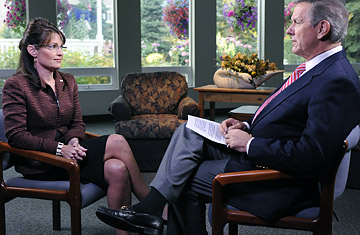
Charles Gibson talks to Republican vice-presidential candidate Governor Sarah Palin in Fairbanks, Alaska, in an interview Thursday, Sept. 11, 2008
By NANCY GIBBS
On a day when people paused and prayed, when Barack Obama joined John McCain at ground zero and made peace with Bill Clinton over lunch, when the ads were stilled and the e-mails sheathed just for a while, GOP vice-presidential candidate Sarah Palin held a peace conference of her own with the mainstream media when she sat down with ABC News anchor Charles Gibson in Fairbanks, Alaska.
Gibson, gentleman journalist, was not about to field-dress Palin before a national television audience, but at times he seemed to be trying. They were sitting practically toe-to-toe, and there was no forced conviviality. From the very beginning, he pushed her on her credentials, her experience, her "hubris" in thinking she was qualified to be Vice President. "I'm ready," she shot back, and when he asked again whether she had hesitated at all before accepting McCain's offer of a place on the ticket, she made it clear that her son was not the only one heading off to war. "You can't blink," she said. "You have to be wired in a way, of being so committed to the mission, the mission that we're on, reform of this country and victory in the war — you can't blink."
She parried questions like a fencer. Pressed about her lack of foreign policy experience, she pivoted to her work on oil and gas policy, calling energy "a foundation of national security." Asked if she'd ever traveled outside the country before her trip last year to Kuwait to visit U.S. soldiers, she spun around to call it a trip of a lifetime, since it also included visits with wounded soldiers in Germany — a stop the McCain campaign repeatedly charged Obama with refusing to make during his trip overseas in July. Asked if she'd ever met a head of state, she raised her unshaken hand like a badge of honor: "We've got to remember what the desire is in this nation at this time," she said. "It is for no more politics as usual and somebody's big fat résumé maybe that shows decades and decades in that Washington establishment where, yeah, they've had opportunity to meet heads of state."
Gibson probed her views of war and peace and the balance between them, and this is where the ice got a little thin. His question about her willingness to defend Georgia from Russia, even if it meant going to war, did allow her to mention that she'd spoken to President Saakashvili to assure him of her support. Gibson pressed her on how she would view Israel attacking Iran's nuclear facilities. "I don't think that we should second-guess the measures Israel has to take to defend themselves and for their security," she replied. Again Gibson asked, Does that mean you would approve an Israeli attack on Iran?
"I don't think we can second-guess what Israel has to do to secure its nation." And again he asked, and again she declined to "second-guess."
So Gibson reshuffled the deck and cast the U.S. as the pre-emptive invader. In asking Palin whether she agreed with the Bush Doctrine, he was actually asking whether she knew what it was. There followed a long pause. But when he asked specifically whether the U.S. had the right to invade Pakistan in pursuit of suspected terrorists, she didn't hold back. "In order to stop Islamic extremists, we must do whatever it takes; and we must not blink, Charlie, in making those tough decisions of where we go and even who we target."
At the end of the broadcast, which came on the day Palin's eldest son Track attended his deployment ceremony to head to Iraq, Gibson asked about statements she had made in her church, when she called on members to pray that the Iraq war is "a task that is from God."
"Are we fighting a holy war?" Gibson asked. Palin suggested that she was invoking not Pat Robertson but Abraham Lincoln. "I would never presume to know God's will," she said. Her model, rather, was a Lincoln assertion: "Let us not pray that God is on our side, in a war or any other time, but let us pray that we are on God's side. That's what that comment was all about, Charlie." And she expressed her pride in "my firstborn, my son, my teenage son," who had made the decision to go fight for his country rather than taking an easier or safer or more comfortable path. "I don't know if the task is from God, Charlie," she said — a striking note of humility after all the certainty that had gone before.
